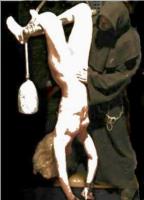 Witchcraft, as used here, is also an abstraction, but one intended to represent directly the terms used by African and other societies to describe their own beliefs and practices. The introductory section of the essay will attempt to identify an African witchcraft idiom which gives broader meaning to texts such as the Beninois oral account of slave-cowry transactions. The concluding section will examine the early-modern European "witch craze" in order to consider how the elaboration of common elements in European and African culture both reflects and mediates differing trajectories into the modern world
Witchcraft, as used here, is also an abstraction, but one intended to represent directly the terms used by African and other societies to describe their own beliefs and practices. The introductory section of the essay will attempt to identify an African witchcraft idiom which gives broader meaning to texts such as the Beninois oral account of slave-cowry transactions. The concluding section will examine the early-modern European "witch craze" in order to consider how the elaboration of common elements in European and African culture both reflects and mediates differing trajectories into the modern world
19.06.2011 | by Ralph A. Austen
 When the Africans discovered that the mato inspired such horror in the Portuguese, they made it their habitual refuge, patiently negotiating from there with the intruders. Queen Njinga, in Angola, played this game to perfection, thus provoking the increasing anger of the Portuguese. Referring to the subterfuges the Portuguese governor opposed to the liberation of her sister, prisoner in Luanda, she wrote on 13 December 1655: “For these and other betrayals I took shelter in the matos, far from my territories” (Cadornega 1972, II: 501). By withdrawing to the forest, the queen was not only obeying a military imperative, but also putting pressure on the Portuguese.
When the Africans discovered that the mato inspired such horror in the Portuguese, they made it their habitual refuge, patiently negotiating from there with the intruders. Queen Njinga, in Angola, played this game to perfection, thus provoking the increasing anger of the Portuguese. Referring to the subterfuges the Portuguese governor opposed to the liberation of her sister, prisoner in Luanda, she wrote on 13 December 1655: “For these and other betrayals I took shelter in the matos, far from my territories” (Cadornega 1972, II: 501). By withdrawing to the forest, the queen was not only obeying a military imperative, but also putting pressure on the Portuguese.
17.05.2011 | by Martín Lienhard
 Since the 1960s, there has been great excitement in many African countries with the creation of art schools. Together with the first exhibitions of self-taught artists, there have also been the first festivals of black art, and even the work of African photographers has begun to establish a reputation for itself in Africa, in European countries and in some forums in the USA. The history of these artistic movements is already being written, describing their schools, their leading figures and their international impact.
Since the 1960s, there has been great excitement in many African countries with the creation of art schools. Together with the first exhibitions of self-taught artists, there have also been the first festivals of black art, and even the work of African photographers has begun to establish a reputation for itself in Africa, in European countries and in some forums in the USA. The history of these artistic movements is already being written, describing their schools, their leading figures and their international impact.
11.05.2011 | by António Pinto Ribeiro
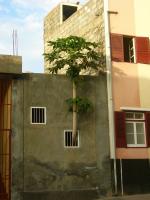 Body, consumption, sexuality, expression, festivity, communality and informality will be analyzed as the central places of the new challenges, negotiations and innovations of citizenship of contemporary young people in Cape Verde.
Body, consumption, sexuality, expression, festivity, communality and informality will be analyzed as the central places of the new challenges, negotiations and innovations of citizenship of contemporary young people in Cape Verde.
01.05.2011 | by Filipe Martins
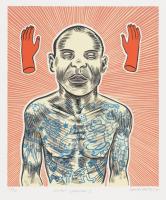 ost-independence Africa is a space of ambivalence, where the aspirations of her people are, ever so often, opposed by her own leaders and by influences from the outside. Her wealth is largely crippled by the West’s use of financial control to make the continents resources available to its own ends. And in recent years, China’s rapidly intensifying economic influence in Africa has become yet another reminder of a new global actor that feeds on globalization and the resultant economic and political expansion, and who has not shied away from reaching out its tentacles to areas troubled by conflict and weak governance. In this conflicting terrain, we must carry with us the words of Walter Benjamin: “The tradition of the oppressed teaches us that the “state of emergency” in which we live is not an exception but a rule.”
ost-independence Africa is a space of ambivalence, where the aspirations of her people are, ever so often, opposed by her own leaders and by influences from the outside. Her wealth is largely crippled by the West’s use of financial control to make the continents resources available to its own ends. And in recent years, China’s rapidly intensifying economic influence in Africa has become yet another reminder of a new global actor that feeds on globalization and the resultant economic and political expansion, and who has not shied away from reaching out its tentacles to areas troubled by conflict and weak governance. In this conflicting terrain, we must carry with us the words of Walter Benjamin: “The tradition of the oppressed teaches us that the “state of emergency” in which we live is not an exception but a rule.”
25.04.2011 | by Stina Edblom
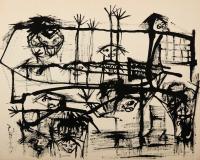 Pancho Guedes (born in 1925), architect, painter, sculptor, collector and patron, played an important cultural role during the years he lived in Mozambique. This is true because of his own work, which brought together several worlds, as well as for his role as mediator between artists of all traditions, the wider public (local and international), and the institutional artistic world, which he had access to at the time.
Pancho Guedes (born in 1925), architect, painter, sculptor, collector and patron, played an important cultural role during the years he lived in Mozambique. This is true because of his own work, which brought together several worlds, as well as for his role as mediator between artists of all traditions, the wider public (local and international), and the institutional artistic world, which he had access to at the time.
20.01.2011 | by Alda Costa
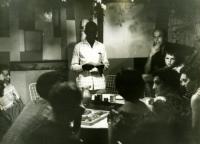 In contrast to the context of Francophile Africa, where the main interest was in literary works and an idea of blackness that involved the relatively contentious appropriation of European modernity, certain mediators, located further south, questioned the possible evolution of local cultures and of their own major artistic traditions, free from the subordination of European models, which were viewed in a critical way in terms of the visual arts. Within the framework of the inevitable death of the tribal art which was characteristic of traditional societies (even via tourist reproductions), new and spontaneous forms of artistic production (and also sophisticated forms of syncretism in the case of "natural synthesis" proposed by Uche Okeke in the Zaria School) were being sought without any nativist essentialism (in the cases of Beier, Guedes and Beinart).
In contrast to the context of Francophile Africa, where the main interest was in literary works and an idea of blackness that involved the relatively contentious appropriation of European modernity, certain mediators, located further south, questioned the possible evolution of local cultures and of their own major artistic traditions, free from the subordination of European models, which were viewed in a critical way in terms of the visual arts. Within the framework of the inevitable death of the tribal art which was characteristic of traditional societies (even via tourist reproductions), new and spontaneous forms of artistic production (and also sophisticated forms of syncretism in the case of "natural synthesis" proposed by Uche Okeke in the Zaria School) were being sought without any nativist essentialism (in the cases of Beier, Guedes and Beinart).
17.12.2010 | by Alexandre Pomar
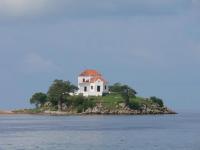 The triangular trade relationship liking Africa and Europe is well known. The “dark continent” supplied the slave labour that America needed, and indeed contributed to its growth, expansion and development. Slave labour also fed into European commercial interests, also generating economic, social, technological, cultural and other development. It is an issue which had repercussions in the relationship between the three continents and its consequences are still the subject of debate, as demographic studies illustrate.
The triangular trade relationship liking Africa and Europe is well known. The “dark continent” supplied the slave labour that America needed, and indeed contributed to its growth, expansion and development. Slave labour also fed into European commercial interests, also generating economic, social, technological, cultural and other development. It is an issue which had repercussions in the relationship between the three continents and its consequences are still the subject of debate, as demographic studies illustrate.
29.11.2010 | by Aurora da Fonseca Ferreira
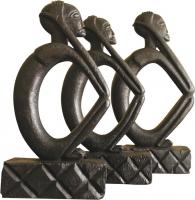 Kundi had succeeded Iala Maku, and now he was getting old. Harmony among the peoples of Lunda was getting strained. Who would succeed the old man Kundi? One of the boys? Tchinguri or Tchinhama? Or the girl, Lwéji, the youngest daughter of his second wife? They say the brothers could not get on together. Tchinguri was more dashing, Tchinhama more thoughtful. However that may be, one day the boys burst into their father's tchota (palace), drunk as lords on palm wine and went for the old man because both of them wanted to take over. The old man was half blind and dying, but he cursed them and told them there and then that neither of them would take his place. He called the macotas (the elders) and said he was handing over to Lwéji, the boys' half-sister. And so the Muatyânvua empire started in heh village of Mussumba, with the marriage of Lwéji, the new Lunda queen, to the Baluba hunter Tchibinda Ilunga.
Kundi had succeeded Iala Maku, and now he was getting old. Harmony among the peoples of Lunda was getting strained. Who would succeed the old man Kundi? One of the boys? Tchinguri or Tchinhama? Or the girl, Lwéji, the youngest daughter of his second wife? They say the brothers could not get on together. Tchinguri was more dashing, Tchinhama more thoughtful. However that may be, one day the boys burst into their father's tchota (palace), drunk as lords on palm wine and went for the old man because both of them wanted to take over. The old man was half blind and dying, but he cursed them and told them there and then that neither of them would take his place. He called the macotas (the elders) and said he was handing over to Lwéji, the boys' half-sister. And so the Muatyânvua empire started in heh village of Mussumba, with the marriage of Lwéji, the new Lunda queen, to the Baluba hunter Tchibinda Ilunga.
31.10.2010 | by Carlos Lousada
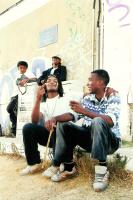 I set out to understand the modes of sociability of the Red Eyes Gang, a group of youths from Arrentela, Seixal, on the outskirts of Lisbon. The majority of them are children of African immigrants from countries that were formerly Portuguese colonies, and live in socioeconomic conditions well below those of the Portuguese. All were born in Portugal or arrived very young, never knowing their parents' countries of origin. However, they appropriate some of their ethnic and cultural heritages because of the stigmatization and racism to which they are subjected, reworking their condition of being poor and black. They do not mechanically reproduce the way of life and ethnic influences of their families, but reinvent them with imagination, thus producing positive statements about themselves.
I set out to understand the modes of sociability of the Red Eyes Gang, a group of youths from Arrentela, Seixal, on the outskirts of Lisbon. The majority of them are children of African immigrants from countries that were formerly Portuguese colonies, and live in socioeconomic conditions well below those of the Portuguese. All were born in Portugal or arrived very young, never knowing their parents' countries of origin. However, they appropriate some of their ethnic and cultural heritages because of the stigmatization and racism to which they are subjected, reworking their condition of being poor and black. They do not mechanically reproduce the way of life and ethnic influences of their families, but reinvent them with imagination, thus producing positive statements about themselves.
21.10.2010 | by Otávio Raposo
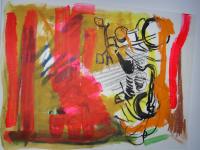 He’d spend hours scripting the captions, and if the papers changed them he’d write to the picture editor to complain. H’s obsession with providing the absolute explanation of the context of his photographs became compulsive. Sometimes he’d write several paragraphs detailing the personal histories of each person — or body — in the picture. He’d also include information about how he’d been feeling when he took the picture, whether he was scared, happy, jealous or guilty.
He’d spend hours scripting the captions, and if the papers changed them he’d write to the picture editor to complain. H’s obsession with providing the absolute explanation of the context of his photographs became compulsive. Sometimes he’d write several paragraphs detailing the personal histories of each person — or body — in the picture. He’d also include information about how he’d been feeling when he took the picture, whether he was scared, happy, jealous or guilty.
11.10.2010 | by Lara Pawson
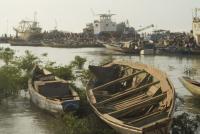 In July 2009, the campaign for the second round of presidential elections in Guinea-Bissau had been on the streets for a week. But the leading players are not only Kumba Ialá and Malam Bacai Sanhá, but also the people, who reject violence and fear the power of the military and narcotraffickers.
In July 2009, the campaign for the second round of presidential elections in Guinea-Bissau had been on the streets for a week. But the leading players are not only Kumba Ialá and Malam Bacai Sanhá, but also the people, who reject violence and fear the power of the military and narcotraffickers.
01.10.2010 | by Pedro Cardoso
 This article asserts that names are an important aspect of any language. It argues that they act as a summary statement of the lives of the named and or those who give the names. The paper further observes that names that the Shona give are an indicator of their response to their situation in life. The situation includes success, failure and misfortune. The paper also observes that some names start off as nicknames and end up becoming family names. It again highlights that some names are not permanent, especially to the younger ones. They can assume new ones, especially with the passage of time due to changed circumstances like when one assumes a titular name, especially when she or he becomes chief or head of a clan.
This article asserts that names are an important aspect of any language. It argues that they act as a summary statement of the lives of the named and or those who give the names. The paper further observes that names that the Shona give are an indicator of their response to their situation in life. The situation includes success, failure and misfortune. The paper also observes that some names start off as nicknames and end up becoming family names. It again highlights that some names are not permanent, especially to the younger ones. They can assume new ones, especially with the passage of time due to changed circumstances like when one assumes a titular name, especially when she or he becomes chief or head of a clan.
25.09.2010 | by Shumirai Nyota
 I can say, perhaps, that this trip has increased our awareness of the uncontrollable aspects of nature (the Icelandic volcano has now served notice to the oblivious) and revealed to us the existence of populations that are able to combine complex social organization and ownership of simple natural resources, which can only be the result of their deep knowledge of the territory.
I can say, perhaps, that this trip has increased our awareness of the uncontrollable aspects of nature (the Icelandic volcano has now served notice to the oblivious) and revealed to us the existence of populations that are able to combine complex social organization and ownership of simple natural resources, which can only be the result of their deep knowledge of the territory.
22.09.2010 | by Cristina Salvador
 Among us Angolan refugees, especially among the elders, there were those who had a special passion for the Portuguese language. I recall spending holidays at Uncle Jeremias Bandua’s house in Meheba refugee camp. In the day, we would often go to the fields to look after the vegetables etc with older Angolan men. Some of these men were also on holidays as they had scholarships and were attending different college in the urban areas.
Among us Angolan refugees, especially among the elders, there were those who had a special passion for the Portuguese language. I recall spending holidays at Uncle Jeremias Bandua’s house in Meheba refugee camp. In the day, we would often go to the fields to look after the vegetables etc with older Angolan men. Some of these men were also on holidays as they had scholarships and were attending different college in the urban areas.
03.09.2010 | by Sousa Jamba
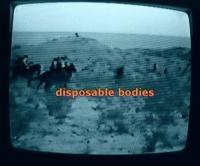 I have decided to act in the symbolic realm. The aim is not to change the world out there but the discourse about the world out there. To sharpen the consciousness about ones proper accountability for global developments. In my artistic and textual work, I try to elaborate on the correlation between high-technologized societies and the production of precarious living conditions. One of my prime concerns is the willingness to recognize that causes and solutions are not always located somewhere on the “outside”.
I have decided to act in the symbolic realm. The aim is not to change the world out there but the discourse about the world out there. To sharpen the consciousness about ones proper accountability for global developments. In my artistic and textual work, I try to elaborate on the correlation between high-technologized societies and the production of precarious living conditions. One of my prime concerns is the willingness to recognize that causes and solutions are not always located somewhere on the “outside”.
27.06.2010 | by Ursula Biemann
 “Geo-archaeological research(GAR)” is a research, held initially in Weimar (Germany), which has indicated several phases of work and diverse areas as fieldwork. This research aims to understand specific intercontinental geological phenomena, proposing the hypothesis of a geological fault, which took place in Europe and had other repercussions.
“Geo-archaeological research(GAR)” is a research, held initially in Weimar (Germany), which has indicated several phases of work and diverse areas as fieldwork. This research aims to understand specific intercontinental geological phenomena, proposing the hypothesis of a geological fault, which took place in Europe and had other repercussions.
28.05.2010 | by Tânia da Fonte
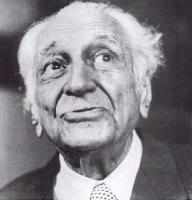 Recent critical readings of Cape Verdean identity and intellectual history highlight the fact that Gilberto Freyre unknowingly destabilized the metanarrative of Euro-centered mestiçagem, by emphasizing instead Cape Verde’s cultural links to Africa (even if those links were impressionistically perceived by him).
Recent critical readings of Cape Verdean identity and intellectual history highlight the fact that Gilberto Freyre unknowingly destabilized the metanarrative of Euro-centered mestiçagem, by emphasizing instead Cape Verde’s cultural links to Africa (even if those links were impressionistically perceived by him).
26.05.2010 | by Fernando Arenas
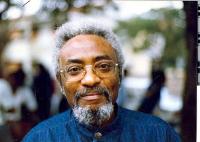 It seems useful to delineate a genealogy of black internationalism as way to understand it's formation. Africa's independencies, beyond the action of africans and africans among the diaspora, take place due to a number of structural shifts. If we place the emergence of african internationalism in a broader perspective it will allow for a understanding of the paradigm changes that took place at the turn of the century.
It seems useful to delineate a genealogy of black internationalism as way to understand it's formation. Africa's independencies, beyond the action of africans and africans among the diaspora, take place due to a number of structural shifts. If we place the emergence of african internationalism in a broader perspective it will allow for a understanding of the paradigm changes that took place at the turn of the century.
15.05.2010 | by António Tomás
 Witchcraft, as used here, is also an abstraction, but one intended to represent directly the terms used by African and other societies to describe their own beliefs and practices. The introductory section of the essay will attempt to identify an African witchcraft idiom which gives broader meaning to texts such as the Beninois oral account of slave-cowry transactions. The concluding section will examine the early-modern European "witch craze" in order to consider how the elaboration of common elements in European and African culture both reflects and mediates differing trajectories into the modern world
Witchcraft, as used here, is also an abstraction, but one intended to represent directly the terms used by African and other societies to describe their own beliefs and practices. The introductory section of the essay will attempt to identify an African witchcraft idiom which gives broader meaning to texts such as the Beninois oral account of slave-cowry transactions. The concluding section will examine the early-modern European "witch craze" in order to consider how the elaboration of common elements in European and African culture both reflects and mediates differing trajectories into the modern world  When the Africans discovered that the mato inspired such horror in the Portuguese, they made it their habitual refuge, patiently negotiating from there with the intruders. Queen Njinga, in Angola, played this game to perfection, thus provoking the increasing anger of the Portuguese. Referring to the subterfuges the Portuguese governor opposed to the liberation of her sister, prisoner in Luanda, she wrote on 13 December 1655: “For these and other betrayals I took shelter in the matos, far from my territories” (Cadornega 1972, II: 501). By withdrawing to the forest, the queen was not only obeying a military imperative, but also putting pressure on the Portuguese.
When the Africans discovered that the mato inspired such horror in the Portuguese, they made it their habitual refuge, patiently negotiating from there with the intruders. Queen Njinga, in Angola, played this game to perfection, thus provoking the increasing anger of the Portuguese. Referring to the subterfuges the Portuguese governor opposed to the liberation of her sister, prisoner in Luanda, she wrote on 13 December 1655: “For these and other betrayals I took shelter in the matos, far from my territories” (Cadornega 1972, II: 501). By withdrawing to the forest, the queen was not only obeying a military imperative, but also putting pressure on the Portuguese.  Since the 1960s, there has been great excitement in many African countries with the creation of art schools. Together with the first exhibitions of self-taught artists, there have also been the first festivals of black art, and even the work of African photographers has begun to establish a reputation for itself in Africa, in European countries and in some forums in the USA. The history of these artistic movements is already being written, describing their schools, their leading figures and their international impact.
Since the 1960s, there has been great excitement in many African countries with the creation of art schools. Together with the first exhibitions of self-taught artists, there have also been the first festivals of black art, and even the work of African photographers has begun to establish a reputation for itself in Africa, in European countries and in some forums in the USA. The history of these artistic movements is already being written, describing their schools, their leading figures and their international impact.  Body, consumption, sexuality, expression, festivity, communality and informality will be analyzed as the central places of the new challenges, negotiations and innovations of citizenship of contemporary young people in Cape Verde.
Body, consumption, sexuality, expression, festivity, communality and informality will be analyzed as the central places of the new challenges, negotiations and innovations of citizenship of contemporary young people in Cape Verde.  ost-independence Africa is a space of ambivalence, where the aspirations of her people are, ever so often, opposed by her own leaders and by influences from the outside. Her wealth is largely crippled by the West’s use of financial control to make the continents resources available to its own ends. And in recent years, China’s rapidly intensifying economic influence in Africa has become yet another reminder of a new global actor that feeds on globalization and the resultant economic and political expansion, and who has not shied away from reaching out its tentacles to areas troubled by conflict and weak governance. In this conflicting terrain, we must carry with us the words of Walter Benjamin: “The tradition of the oppressed teaches us that the “state of emergency” in which we live is not an exception but a rule.”
ost-independence Africa is a space of ambivalence, where the aspirations of her people are, ever so often, opposed by her own leaders and by influences from the outside. Her wealth is largely crippled by the West’s use of financial control to make the continents resources available to its own ends. And in recent years, China’s rapidly intensifying economic influence in Africa has become yet another reminder of a new global actor that feeds on globalization and the resultant economic and political expansion, and who has not shied away from reaching out its tentacles to areas troubled by conflict and weak governance. In this conflicting terrain, we must carry with us the words of Walter Benjamin: “The tradition of the oppressed teaches us that the “state of emergency” in which we live is not an exception but a rule.”  Pancho Guedes (born in 1925), architect, painter, sculptor, collector and patron, played an important cultural role during the years he lived in Mozambique. This is true because of his own work, which brought together several worlds, as well as for his role as mediator between artists of all traditions, the wider public (local and international), and the institutional artistic world, which he had access to at the time.
Pancho Guedes (born in 1925), architect, painter, sculptor, collector and patron, played an important cultural role during the years he lived in Mozambique. This is true because of his own work, which brought together several worlds, as well as for his role as mediator between artists of all traditions, the wider public (local and international), and the institutional artistic world, which he had access to at the time.  In contrast to the context of Francophile Africa, where the main interest was in literary works and an idea of blackness that involved the relatively contentious appropriation of European modernity, certain mediators, located further south, questioned the possible evolution of local cultures and of their own major artistic traditions, free from the subordination of European models, which were viewed in a critical way in terms of the visual arts. Within the framework of the inevitable death of the tribal art which was characteristic of traditional societies (even via tourist reproductions), new and spontaneous forms of artistic production (and also sophisticated forms of syncretism in the case of "natural synthesis" proposed by Uche Okeke in the Zaria School) were being sought without any nativist essentialism (in the cases of Beier, Guedes and Beinart).
In contrast to the context of Francophile Africa, where the main interest was in literary works and an idea of blackness that involved the relatively contentious appropriation of European modernity, certain mediators, located further south, questioned the possible evolution of local cultures and of their own major artistic traditions, free from the subordination of European models, which were viewed in a critical way in terms of the visual arts. Within the framework of the inevitable death of the tribal art which was characteristic of traditional societies (even via tourist reproductions), new and spontaneous forms of artistic production (and also sophisticated forms of syncretism in the case of "natural synthesis" proposed by Uche Okeke in the Zaria School) were being sought without any nativist essentialism (in the cases of Beier, Guedes and Beinart).  The triangular trade relationship liking Africa and Europe is well known. The “dark continent” supplied the slave labour that America needed, and indeed contributed to its growth, expansion and development. Slave labour also fed into European commercial interests, also generating economic, social, technological, cultural and other development. It is an issue which had repercussions in the relationship between the three continents and its consequences are still the subject of debate, as demographic studies illustrate.
The triangular trade relationship liking Africa and Europe is well known. The “dark continent” supplied the slave labour that America needed, and indeed contributed to its growth, expansion and development. Slave labour also fed into European commercial interests, also generating economic, social, technological, cultural and other development. It is an issue which had repercussions in the relationship between the three continents and its consequences are still the subject of debate, as demographic studies illustrate.  Kundi had succeeded Iala Maku, and now he was getting old. Harmony among the peoples of Lunda was getting strained. Who would succeed the old man Kundi? One of the boys? Tchinguri or Tchinhama? Or the girl, Lwéji, the youngest daughter of his second wife? They say the brothers could not get on together. Tchinguri was more dashing, Tchinhama more thoughtful. However that may be, one day the boys burst into their father's tchota (palace), drunk as lords on palm wine and went for the old man because both of them wanted to take over. The old man was half blind and dying, but he cursed them and told them there and then that neither of them would take his place. He called the macotas (the elders) and said he was handing over to Lwéji, the boys' half-sister. And so the Muatyânvua empire started in heh village of Mussumba, with the marriage of Lwéji, the new Lunda queen, to the Baluba hunter Tchibinda Ilunga.
Kundi had succeeded Iala Maku, and now he was getting old. Harmony among the peoples of Lunda was getting strained. Who would succeed the old man Kundi? One of the boys? Tchinguri or Tchinhama? Or the girl, Lwéji, the youngest daughter of his second wife? They say the brothers could not get on together. Tchinguri was more dashing, Tchinhama more thoughtful. However that may be, one day the boys burst into their father's tchota (palace), drunk as lords on palm wine and went for the old man because both of them wanted to take over. The old man was half blind and dying, but he cursed them and told them there and then that neither of them would take his place. He called the macotas (the elders) and said he was handing over to Lwéji, the boys' half-sister. And so the Muatyânvua empire started in heh village of Mussumba, with the marriage of Lwéji, the new Lunda queen, to the Baluba hunter Tchibinda Ilunga.  I set out to understand the modes of sociability of the Red Eyes Gang, a group of youths from Arrentela, Seixal, on the outskirts of Lisbon. The majority of them are children of African immigrants from countries that were formerly Portuguese colonies, and live in socioeconomic conditions well below those of the Portuguese. All were born in Portugal or arrived very young, never knowing their parents' countries of origin. However, they appropriate some of their ethnic and cultural heritages because of the stigmatization and racism to which they are subjected, reworking their condition of being poor and black. They do not mechanically reproduce the way of life and ethnic influences of their families, but reinvent them with imagination, thus producing positive statements about themselves.
I set out to understand the modes of sociability of the Red Eyes Gang, a group of youths from Arrentela, Seixal, on the outskirts of Lisbon. The majority of them are children of African immigrants from countries that were formerly Portuguese colonies, and live in socioeconomic conditions well below those of the Portuguese. All were born in Portugal or arrived very young, never knowing their parents' countries of origin. However, they appropriate some of their ethnic and cultural heritages because of the stigmatization and racism to which they are subjected, reworking their condition of being poor and black. They do not mechanically reproduce the way of life and ethnic influences of their families, but reinvent them with imagination, thus producing positive statements about themselves.  He’d spend hours scripting the captions, and if the papers changed them he’d write to the picture editor to complain. H’s obsession with providing the absolute explanation of the context of his photographs became compulsive. Sometimes he’d write several paragraphs detailing the personal histories of each person — or body — in the picture. He’d also include information about how he’d been feeling when he took the picture, whether he was scared, happy, jealous or guilty.
He’d spend hours scripting the captions, and if the papers changed them he’d write to the picture editor to complain. H’s obsession with providing the absolute explanation of the context of his photographs became compulsive. Sometimes he’d write several paragraphs detailing the personal histories of each person — or body — in the picture. He’d also include information about how he’d been feeling when he took the picture, whether he was scared, happy, jealous or guilty.  In July 2009, the campaign for the second round of presidential elections in Guinea-Bissau had been on the streets for a week. But the leading players are not only Kumba Ialá and Malam Bacai Sanhá, but also the people, who reject violence and fear the power of the military and narcotraffickers.
In July 2009, the campaign for the second round of presidential elections in Guinea-Bissau had been on the streets for a week. But the leading players are not only Kumba Ialá and Malam Bacai Sanhá, but also the people, who reject violence and fear the power of the military and narcotraffickers.  This article asserts that names are an important aspect of any language. It argues that they act as a summary statement of the lives of the named and or those who give the names. The paper further observes that names that the Shona give are an indicator of their response to their situation in life. The situation includes success, failure and misfortune. The paper also observes that some names start off as nicknames and end up becoming family names. It again highlights that some names are not permanent, especially to the younger ones. They can assume new ones, especially with the passage of time due to changed circumstances like when one assumes a titular name, especially when she or he becomes chief or head of a clan.
This article asserts that names are an important aspect of any language. It argues that they act as a summary statement of the lives of the named and or those who give the names. The paper further observes that names that the Shona give are an indicator of their response to their situation in life. The situation includes success, failure and misfortune. The paper also observes that some names start off as nicknames and end up becoming family names. It again highlights that some names are not permanent, especially to the younger ones. They can assume new ones, especially with the passage of time due to changed circumstances like when one assumes a titular name, especially when she or he becomes chief or head of a clan.  I can say, perhaps, that this trip has increased our awareness of the uncontrollable aspects of nature (the Icelandic volcano has now served notice to the oblivious) and revealed to us the existence of populations that are able to combine complex social organization and ownership of simple natural resources, which can only be the result of their deep knowledge of the territory.
I can say, perhaps, that this trip has increased our awareness of the uncontrollable aspects of nature (the Icelandic volcano has now served notice to the oblivious) and revealed to us the existence of populations that are able to combine complex social organization and ownership of simple natural resources, which can only be the result of their deep knowledge of the territory.  Among us Angolan refugees, especially among the elders, there were those who had a special passion for the Portuguese language. I recall spending holidays at Uncle Jeremias Bandua’s house in Meheba refugee camp. In the day, we would often go to the fields to look after the vegetables etc with older Angolan men. Some of these men were also on holidays as they had scholarships and were attending different college in the urban areas.
Among us Angolan refugees, especially among the elders, there were those who had a special passion for the Portuguese language. I recall spending holidays at Uncle Jeremias Bandua’s house in Meheba refugee camp. In the day, we would often go to the fields to look after the vegetables etc with older Angolan men. Some of these men were also on holidays as they had scholarships and were attending different college in the urban areas.  I have decided to act in the symbolic realm. The aim is not to change the world out there but the discourse about the world out there. To sharpen the consciousness about ones proper accountability for global developments. In my artistic and textual work, I try to elaborate on the correlation between high-technologized societies and the production of precarious living conditions. One of my prime concerns is the willingness to recognize that causes and solutions are not always located somewhere on the “outside”.
I have decided to act in the symbolic realm. The aim is not to change the world out there but the discourse about the world out there. To sharpen the consciousness about ones proper accountability for global developments. In my artistic and textual work, I try to elaborate on the correlation between high-technologized societies and the production of precarious living conditions. One of my prime concerns is the willingness to recognize that causes and solutions are not always located somewhere on the “outside”.  Recent critical readings of Cape Verdean identity and intellectual history highlight the fact that Gilberto Freyre unknowingly destabilized the metanarrative of Euro-centered mestiçagem, by emphasizing instead Cape Verde’s cultural links to Africa (even if those links were impressionistically perceived by him).
Recent critical readings of Cape Verdean identity and intellectual history highlight the fact that Gilberto Freyre unknowingly destabilized the metanarrative of Euro-centered mestiçagem, by emphasizing instead Cape Verde’s cultural links to Africa (even if those links were impressionistically perceived by him).  It seems useful to delineate a genealogy of black internationalism as way to understand it's formation. Africa's independencies, beyond the action of africans and africans among the diaspora, take place due to a number of structural shifts. If we place the emergence of african internationalism in a broader perspective it will allow for a understanding of the paradigm changes that took place at the turn of the century.
It seems useful to delineate a genealogy of black internationalism as way to understand it's formation. Africa's independencies, beyond the action of africans and africans among the diaspora, take place due to a number of structural shifts. If we place the emergence of african internationalism in a broader perspective it will allow for a understanding of the paradigm changes that took place at the turn of the century. 